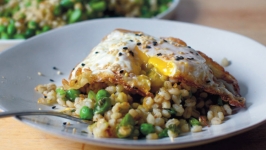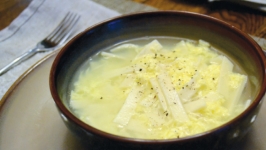Edible Health: The Epitome of Eggs
Eggs have been a staple of our diet for centuries. They bind together baked goods, pasta and quiche, and are the main attraction of morning skillets. However you crack them, eggs are wholesome, satisfying and simple to prepare.
However, not all eggs are created equal. Unless you've been cooped up recently, you've probably heard that free-range eggs are better for you than conventional eggs. Why is this so? Because their nutrition starts at the source: the hen.
Brenda Slack of Milk House Farm Market in Newtown, Pennsylvania, a regular vendor at the Stockton Market, proudly tends 1,000 pastured hens. She feeds them an all-natural, no-animal-by-products, GMO-free pellet as a supplement, but says most of what they eat comes from the field. In addition to giving the hens full access to forage in grass pastures, Slack sows her land with other plants hens love, like alfalfa and buckwheat. "The additional nutrition helps boost the omega-3 and omega-6 content in the eggs, and gives the yolks their bright-orange color and rich flavor," she says.
Eggs are nutritious, but their cholesterol content dictates that we eat them within limits. "Eggs are not bad for you, but they are if you consume more than 300 mg of cholesterol a day – 200 mg if you have a history of high cholesterol or heart disease, or have had a stroke," says cardiologist Dr. Sharan Mahal of Somerset Medical Center. "Egg yolks contain 180 mg of cholesterol, which is almost all of your daily allowance. If you eat eggs for one meal, opt to go meat-free for the others."
Focusing only on the cholesterol in eggs would be a mistake, though, since eggs are quite good for you otherwise. "We're finding that trans and processed fats are much more detrimental to one's health than the cholesterol in eggs," says Anna Baratta, a registered dietician at Robert Wood Johnson University Hospital in New Brunswick. "Eggs provide an excellent source of vital nutrients like vitamins A, B6, and B12; antioxidants; and vitamin D, which is often hard to get enough of since people don't get outside as much as they should." In addition to vitamins, Baratta cites eggs as a fantastic source of protein. "The protein in eggs is very bioavailable, meaning it is easily broken down and absorbed into the body to be utilized in the construction of lean body mass and the rebuilding of tissues," she says.
So whether you believe it was the chicken or the egg, when it comes to nutrition, it's clear which comes first.
Egg Cooking Tips
By Chef Will Mooney, The Brother's Moon, Hopewell
For the perfect scramble:
The trick for fluffy scrambled eggs is to get lots of air bubbles into the mix. Just before cooking, whip your eggs with a dash of milk with a fork (or whisk) for two minutes or until the mixture becomes a single color and starts to get foamy. For best results, slightly tilt the bowl and beat the eggs from the bottom up.
For the perfect fried egg:
Heat a nonstick pan over low heat, with 1 teaspoon butter. Tilt the pan to spread out the butter. When the butter starts to foam, crack your egg into the pan, then simply cover the pan with a lid for the duration of the cooking time (to your desired firmness). Covering the pan with a lid helps speed up the cooking time. Season with sea salt and freshly ground pepper and serve as is or alongside a piece of toast.











